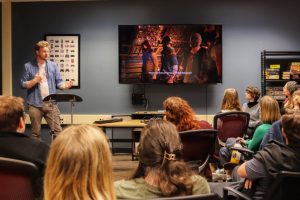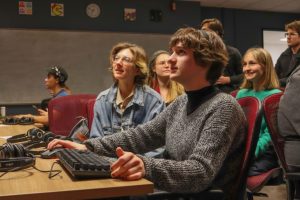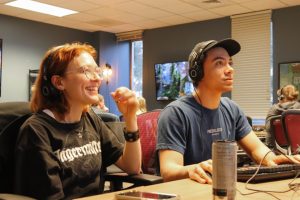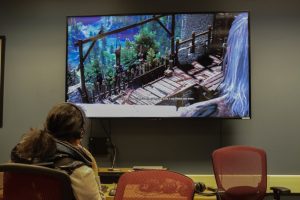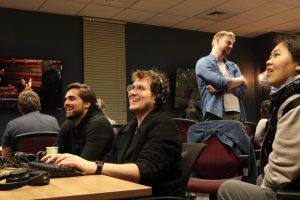This February, the Digital Literacy Communications Lab (DLC) and the Medieval and Early Modern Studies (MEMS) program collaborated to host another successful Medieval Gaming Event in the Greenlaw Gameroom. This learn-and-play event centered on the award-winning, open-world RPG The Witcher 3: The Wild Hunt (2015) followed by a discussion led by Professor Taylor Cowdery to contextualize the game.
The Witcher 3 is played through the itinerant monster-hunter and contract-worker Geralt of Rivia who wanders from medieval town to medieval town, solving monsters for a fee. Over the course of this game, the player must frequently make choices that directly impact the gaming world.
Prof. Cowdery and the Critical Gaming team decided on this game because it is among the most recent, well-known games to feature a medieval (or medievalizing) world. Prof. Cowdery was especially interested in inviting students to consider how important AAA games represent the medieval past and how open world RPGs “thematize moral choice.” Prof. Cowdery added:
“I wanted to do a literary game, which also describes The Witcher 3—it’s based on a series of books, of course, but many of the side quests in the game read a bit like little gothic short stories.”
In speaking to the relationship between gaming and medievalism, Prof Cowdery said that players often “turn to immersive RPGs for many of the same reasons that they turn to medievalizing fantasy literature, television, and film.” In sum, medievalism invites players to consider difficult social, political, and moral problems in a context that makes it more comfortable for them to think about. Prof. Cowdery added:
“For example, many medievalizing products of culture set up an artificial moral paradigm in which certain forces or ideas are explicitly labeled as “good” and others as “bad”. (Star Wars, with its “light” and “dark” sides of the force, is a good example.) Others allow the reader to confront terrifying forces that would be irresistible in reality—say, the end of the world—and to prevent them from happening, or even make it possible for players to resolve into a perfect, ‘happy ending’ that would, again, be inconceivable in reality. In all of these cases, writers, game designers, and producers may turn to widely-held fantasies about the Middle Ages because those fantasies offer audiences a familiar vision of a simpler and more innocent time, one in which it was easier to fight against evil, for example, or to make the right choice, or to confront your enemies and vanquish them for good.”
These artificial moral paradigms are also important when considering how medievalizing work represents these “ideas in the negative”:
“Game of Thrones, for example, presents a sensationalized and hyperviolent vision of the medieval past that is just as much rooted in a fantasy (this one about power, nihilism, fascism, and immorality) as, say, Ocarina of Time might be.”
This event was largely inspired by a very successful collaboration between Prof. Harry Cushman and DLC Director Courtney Rivard in the fall semester of 2023. You can read more about that event here.
Prof. Cowdery wanted to “see if we could replicate that, but with a different kind of game.” Prof. Cowdery is also “exploring the possibility of teaching a class on medievalism, one that would feature a gaming module” but did not have experience teaching games in the past. In other words, be on the lookout for an incredibly exciting course in the near future!
For any undergraduates interested in these topics and those like it, the DOECL offers the MEMS minor! This minor provides students with a broad, humanities-based approach to the rich and fascinating cultures that flourished globally from around 500 CE to 1800 CE. Choose from over 150 courses in more than twelve departments to create your own minor!
In closing, Prof. Cowdery wanted to offer a special word of thanks to the DLC and Gaming Lab team for making this event possible.
For more gaming events and courses, please be on the lookout for announcements from the DLC’s Critical Games Studies Program. We look forward to more collaborations in the future!


